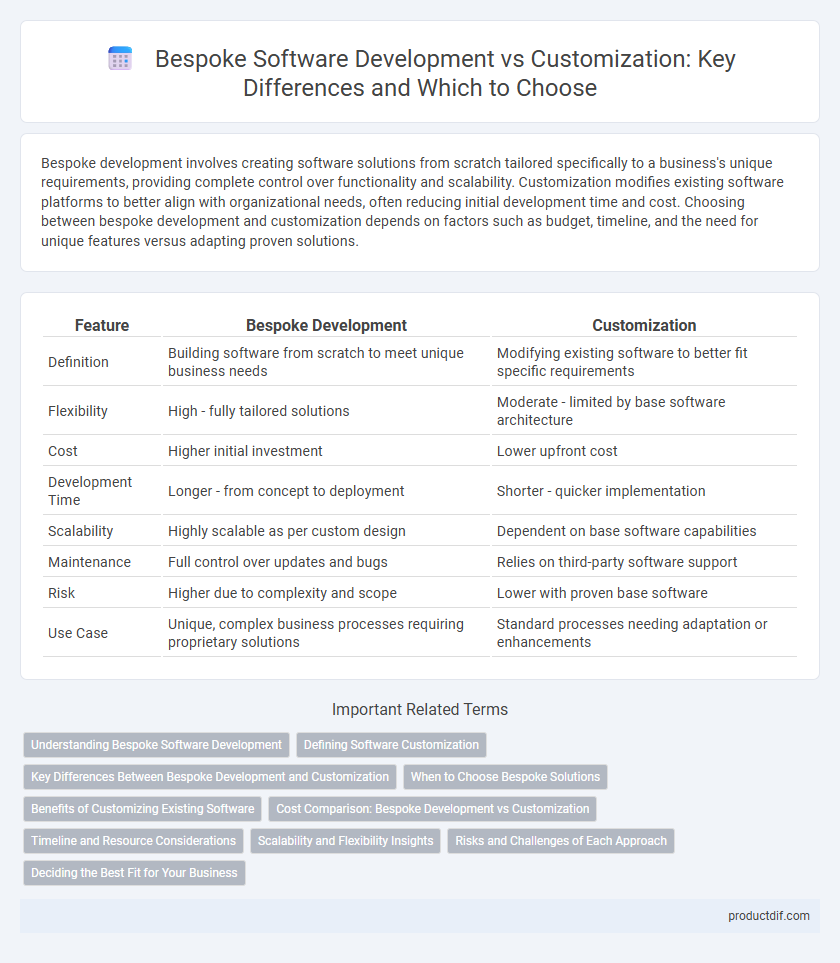Bespoke development involves creating software solutions from scratch tailored specifically to a business's unique requirements, providing complete control over functionality and scalability. Customization modifies existing software platforms to better align with organizational needs, often reducing initial development time and cost. Choosing between bespoke development and customization depends on factors such as budget, timeline, and the need for unique features versus adapting proven solutions.
Table of Comparison
| Feature | Bespoke Development | Customization |
|---|---|---|
| Definition | Building software from scratch to meet unique business needs | Modifying existing software to better fit specific requirements |
| Flexibility | High - fully tailored solutions | Moderate - limited by base software architecture |
| Cost | Higher initial investment | Lower upfront cost |
| Development Time | Longer - from concept to deployment | Shorter - quicker implementation |
| Scalability | Highly scalable as per custom design | Dependent on base software capabilities |
| Maintenance | Full control over updates and bugs | Relies on third-party software support |
| Risk | Higher due to complexity and scope | Lower with proven base software |
| Use Case | Unique, complex business processes requiring proprietary solutions | Standard processes needing adaptation or enhancements |
Understanding Bespoke Software Development
Bespoke software development involves creating tailor-made applications specifically designed to meet unique business requirements, offering greater flexibility and scalability compared to off-the-shelf solutions. Unlike customization, which modifies existing software frameworks, bespoke solutions are built from the ground up, ensuring full alignment with organizational workflows and objectives. This approach optimizes operational efficiency and enhances competitive advantage by delivering precise functionality unattainable through generic software.
Defining Software Customization
Software customization involves modifying existing software applications to meet specific user requirements, enhancing functionality without altering the core architecture. It contrasts with bespoke development, which entails building software from scratch tailored entirely to unique business needs. Customization optimizes user experience and operational efficiency by adapting pre-built solutions rather than creating new systems.
Key Differences Between Bespoke Development and Customization
Bespoke development involves creating software solutions tailored from scratch to meet specific business requirements, ensuring unique functionality and scalability. Customization modifies existing software or platforms to better fit user needs, often limited by the original architecture and features. Key differences include the level of flexibility, cost implications, development time, and the ability to evolve without constraints inherent in pre-built systems.
When to Choose Bespoke Solutions
Bespoke software development is ideal when businesses require unique functionality that off-the-shelf software cannot provide, ensuring complete alignment with specific workflows and scalability needs. Organizations facing complex processes or competitive differentiation benefit from tailor-made solutions that offer full control over features and integration. This approach often results in higher upfront investment but delivers long-term value through enhanced efficiency and adaptability.
Benefits of Customizing Existing Software
Customizing existing software significantly reduces development time and cost by leveraging pre-built frameworks and functionalities, allowing businesses to quickly adapt to market demands. This approach enhances scalability and integration with other systems, providing a flexible solution tailored to specific operational needs without the risks associated with building from scratch. Continuous updates and vendor support further ensure stability and ongoing improvements, maximizing the software's long-term value.
Cost Comparison: Bespoke Development vs Customization
Bespoke development typically involves higher upfront costs due to the need for building software tailored from scratch, whereas customization leverages existing platforms, reducing initial expenses significantly. Over time, bespoke solutions may offer better scalability and adaptability, potentially lowering long-term operational costs despite the initial investment. Customization costs can escalate with complex modifications, making it essential to evaluate total cost of ownership before deciding.
Timeline and Resource Considerations
Bespoke development requires a longer timeline and more extensive resources due to building a software solution from scratch tailored to specific business needs. Customization leverages existing platforms or software, reducing development time and resource allocation by modifying pre-built features. Efficient project planning must weigh the extended duration and resource demands of bespoke solutions against the quicker, cost-effective deployment possible with customization.
Scalability and Flexibility Insights
Bespoke development offers unparalleled scalability by building software tailored specifically to evolving business needs, allowing seamless integration of new features and technologies. Customization modifies existing software frameworks, which can limit flexibility and scalability due to inherent design constraints. Enterprises seeking long-term growth and adaptive solutions prefer bespoke development to ensure software architecture aligns precisely with future scalability demands and operational flexibility.
Risks and Challenges of Each Approach
Bespoke development involves building software from scratch tailored to specific business needs, but it carries risks such as higher costs, longer development times, and potential difficulties in scaling or maintaining the codebase. Customization modifies existing software platforms, which reduces initial expenses and speeds deployment but may face challenges like limited flexibility, dependency on vendor updates, and potential integration issues. Both approaches require careful risk management around project scope, resource allocation, and long-term support to ensure successful implementation and alignment with business goals.
Deciding the Best Fit for Your Business
Bespoke development offers tailored software solutions built from the ground up to meet specific business requirements, ensuring full control and scalability. Customization modifies existing software platforms, providing quicker implementation and cost efficiency while maintaining core functionalities. Choosing between bespoke development and customization depends on factors such as project complexity, budget, timeline, and desired flexibility for future growth.
Bespoke Development vs Customization Infographic

 productdif.com
productdif.com